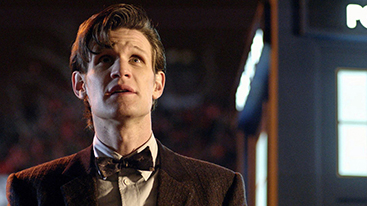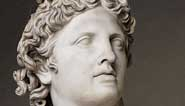This content is associated with The Open University's History courses and qualifications.
 Doctor Who, which celebrates its fiftieth anniversary this year, is best known as a science fiction series. Think of the show, and you think of sci-fi concepts such as the TARDIS, and alien creatures like the Daleks or Cybermen. But, as the Doctor says to Rose of the TARDIS at the end of the first episode of the 2005 relaunch: ‘Did I mention that it also travels in time?’ Doctor Who has always had a close relationship with human history.
Doctor Who, which celebrates its fiftieth anniversary this year, is best known as a science fiction series. Think of the show, and you think of sci-fi concepts such as the TARDIS, and alien creatures like the Daleks or Cybermen. But, as the Doctor says to Rose of the TARDIS at the end of the first episode of the 2005 relaunch: ‘Did I mention that it also travels in time?’ Doctor Who has always had a close relationship with human history.
When first conceived, Doctor Who was meant to have two types of stories – science fiction adventures in the future or on alien worlds, and stories that placed the Doctor and his companions in the past. The show never quite alternated from one to the other, as originally intended. Nevertheless, in the era of the first Doctor, William Hartnell (1963-1966) just over a third of the broadcast stories (ten out of twenty-nine) were ‘historicals’, time-travel stories in which the Doctor encountered famous people or visited famous periods from history.
A change in the style of the historicals came at the beginning of the second season, in 1964. Previously, these stories had engaged with history, and historical accounts of the period had been the main sources in shaping what appeared on screen. Beginning with The Romans, genre and story would become the prime motivators. Historical sources would still be consulted, but at the core of these episodes were stories of the period that had already been told. The Romans was a fairly close parody of the Hollywood epic Quo Vadis, to the point of lifting a couple of scenes; The Myth Makers (1965) took the viewers into the world of Homer’s Iliad.
The other change in these historicals concerns the involvement of the Doctor. In the early stories he tried to be a dispassionate and uninvolved observer – in The Aztecs he famously told his companion Barbara (who was a history teacher) that ‘You can’t rewrite history! Not one line!’ By The Gunfighters (1966), he was an active participant, trying to avert the 1881 Gunfight at the O.K. Corral.
A problem with these stories is that often the bad guys won – no matter what he tried, the Doctor could not, for instance, stop the Greeks massacring the people of Troy. The more the Doctor got involved, the more obvious this was. So these stories were replaced after Patrick Troughton’s The Highlanders (1966). In their place came the ‘pseudo-historical’, first tried out with The Time Meddler (1965). In these stories the Doctor travelled back into human history to prevent some alien force destroying earth in the past.
However, in the Patrick Troughton (1966-1969) and Jon Pertwee eras (1970-1974), there was little interest in travelling to the past at all, and very few stories feature this as an element (though Jon Pertwee’s Doctor was constantly name-dropping all the famous personages, such as Napoleon, he had met in the past). Only in the era of the fourth Doctor, Tom Baker (1974-1981), did the pseudo-historical come into its own, with such classic stories as Pyramids of Mars (1975) and The Talons of Weng-Chiang (1977).
Such stories continued to feature in the eras of Peter Davison (1982-1984), Colin Baker (1984-1986) and Sylvester McCoy (1987-1989). In 1982 there was a brief return to the pure historical format, in Black Orchid – but though this strictly speaking featured no science-fictional element, it was structured like a typical monster story, which earlier historicals had not been.
When the show returned in 2005, new producer Russell T. Davies deliberately wanted to set all the stories on Earth, so it was inevitable that human history would be visited regularly. However, for all the visits to Victorian England (now something of a favourite location, in stories such as ‘The Next Doctor’, 2008, and ‘The Crimson Horror’, 2013), the stories remain firmly in the pseudo-historical format. Doctor Who is very much aware that it is at heart a science fiction series, and so an alien threat is always the order of the day. That will no doubt continue as the show moves forward.
Visit Tony's blog to read more of his work on Doctor Who, and other interesting history topics.






Rate and Review
Rate this article
Review this article
Log into OpenLearn to leave reviews and join in the conversation.
Article reviews